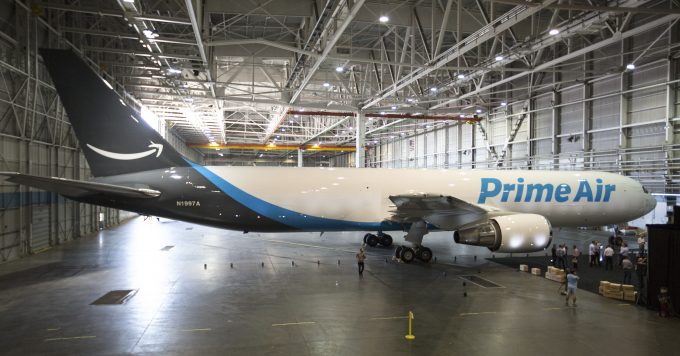Air cargo capacity squeeze could linger 'until the end of the decade'
Air cargo’s capacity shortage “will not be resolved any time soon”, and could linger “until ...
F: MAKING MONEY IN CHINAMAERSK: THE DAY AFTERDHL: NEW DEALGXO: NEW PARTNERSHIPKNIN: MATCHING PREVIOUS LOWSEXPD: VALUE AND LEGAL RISKMAERSK: DOWN SHE GOESVW: PAY CUTFDX: INSIDER BUYXOM: THE PAIN IS FELTUPS: CLOSING DEALSGXO: LOOKING FOR VALUE
F: MAKING MONEY IN CHINAMAERSK: THE DAY AFTERDHL: NEW DEALGXO: NEW PARTNERSHIPKNIN: MATCHING PREVIOUS LOWSEXPD: VALUE AND LEGAL RISKMAERSK: DOWN SHE GOESVW: PAY CUTFDX: INSIDER BUYXOM: THE PAIN IS FELTUPS: CLOSING DEALSGXO: LOOKING FOR VALUE

Pilots are no shrinking violets, as we say in the UK. You only have to read a pilot message board to see frequent gripes about what is undoubtedly a tough job.
But the recent onslaught of PR from pilots flying indirectly for Amazon – the International Brotherhood of Teamsters divisions representing pilots at Atlas, Southern and ABX – shrouds a darker story of labour relations with management.
Perhaps emboldened by Trump policies, and certainly working towards negotiations over a new collective bargaining agreement (CBA), the pilots are seeking – and gaining – publicity. They have released a video; they protested at yesterday’s Amazon shareholder meeting; they send out numerous PRs.
But to what end? Amazon, one suspects, has very little interest in getting involved with its suppliers’ labour relations. And a strongly managed company such as Atlas Air is unlikely to be swayed by public opinion, or pilot press coverage.
Atlas, of course, famously took its pilots to court following an extended slowdown, which in itself could be deemed a corporate failure. Surely, suing one’s own employees is a last resort, an admission of failure at the negotiating table.
But when you go through the court documents, the facts – as laid out by Atlas – are quite startling and reveal a union not bargaining, but exerting unfair leverage.
In evidence submitted by Atlas, pilots were openly talking about how to affect operations. While most call for strict adherence to the CBA, they also advocate “liberally writing-up airplanes for mechanical issues” and “not pushing to get an airplane out on time”. “If you hit minimum departure fuel before getting to the runway, taxi back and try again.”
This was clearly damaging to Atlas operations, which saw an 83% increase in flight delays of six hours or more during the slowdown; military flights saw a 200% increase in prolonged flight delays.
However, the pilots also make clear that Atlas left the negotiating table.
Atlas is one of the best air freight – and possibly air transport – companies in the world. It is profitable, it is efficient, it has diversified its business, making it resilient in different market conditions. Most people in the industry express admiration for its remarkable sales ability, if not for its culture or character.
The pilots claim that the (remarkably well-paid) Atlas management wants them to abandon their “quest for an industry-leading CBA”. And that may be true. Costs are a negative, and Atlas’s labour costs are rising as it expands its fleet to accommodate Amazon, among other companies.
But as an industry-leading company, why should it not have an industry-leading CBA? It purports to be the best, so why not be the best for all Atlas stakeholders?
Neither side is covering itself in glory here. The union focus on publicity should be exchanged for a focus on working with management; Atlas’s focus on investors and legal action with its own staff could be better directed to forging an improved relationship with those that work with it.
It’s a sorry tale on both sides.
Comment on this article
John
May 31, 2018 at 5:38 pmSome points to consider. You can’t write up maintenance issues that don’t exist. The minimum fuel is derived from the company’s dispatchers and is a legal requirement a pilot can’t ignore. Atlas tries to operate at maximum efficiency, which means maximum load for the route. This can lead to a very small difference between maximum and minimum fuel for takeoff. Ignored in this article is the major change of the system operations and lots of experience staff due to the move. As in a huge turn over in the pilot group and you have a perfect storm to cause operational problems. I would encourage some more in depth retiring in this subject. You only are scratching the surface of the challenges in this area of the industry.
Alex Lennane
June 01, 2018 at 1:30 pmThanks for your comment, John. I do appreciate that there are far more complex issues here than this article allowed for. But perhaps that’s even more reason, then, for management and unions to sit down and talk through the operational challenges, instead of fighting through the media or courts.
John
June 03, 2018 at 3:00 pmIn my experience at a few airlines, management has a distinct advantage. They play that by not really talking out practical solutions until severe impact occur to their operations. In a couple of airlines they have even decided to not show up, costing money a time to the unions. With US carriers being bound by Railroad Labor Act they don’t have the same ball field to play in that say a European carrier does.